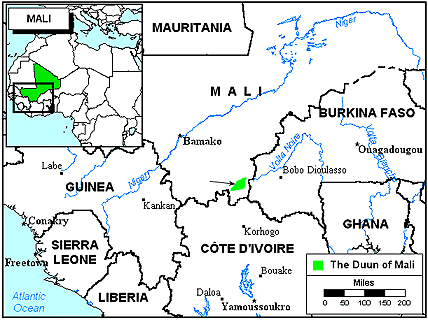|
|
Prayer Profile
The Duun of Mali
![[IMAGE]](../images5/0882.jpg) The 79,000 Duun, also known as the Samogho, live in the African country of Mali near the border of Burkina Faso. Approximately 15,000 Duun live across the border in Burkina Faso. Their language is known as Duu.
The 79,000 Duun, also known as the Samogho, live in the African country of Mali near the border of Burkina Faso. Approximately 15,000 Duun live across the border in Burkina Faso. Their language is known as Duu.
The climate for this region of Africa is hot and dry. Only between 30 and 40 inches of rain fall in the area each year. The temperature can reach above 100ºF in the hot season. For those Duun who live in Burkina Faso, scattered forests provide a place to live. In these forests live hippopotamuses, as well as monkeys, various insects, and birds.
The Duun would prefer to live near the rivers because the vegetation is thicker and the heat is more bearable. However, the tsetse fly (which carries sleeping sickness) and the simulium fly (which carries river blindness) live near the rivers. These insects make the river areas almost uninhabitable and cause many Duun to suffer from associated medical problems.
What are their lives like?
For the Duun, the household is the basic economic unit. The villages are large and usually highly populated. Houses are rectangular with flat roofs, much like those of neighboring tribes. However, the Duun villages have dome-shaped granaries which rise above the village walls. Each village may have at least 100 of these granaries. Every village has a headman who acts as the authority to family lineages, rather than as the authority to individual households.
Duun society is patrilineal in structure. This means that the lines of descent are traced through the fathers. Private property is inherited by the eldest son, while household property is passed to the younger brother of the father. Married sons attach their households to the household of their father.
When a girl marries, the girl's family does not require a "bride-price," as families in other West African tribes do. Instead, the groom gives premarital gifts to the girl's family. The gifts are usually animals such as chickens or goats. Like many other tribes in West Africa, the men sometimes practice polygamy, the marrying of several wives.
In Burkina Faso, the Mossi tribe lives to the east of the Duun, and the two tribes are usually at odds with each other. Raids and retaliations occur often. The Mossi tribe is usually the aggressor, while the Duun continually try to make restitution.
What are their beliefs?
The majority of the Duun practice various ethnic religions, and a sizable minority are Muslim. Those who are Muslim hold to the five essential duties of Islam: (1) Affirming that "there is no god but Allah and Mohammed is his prophet;" (2) praying five times a day while facing Mecca; (3) giving alms generously; (4) fasting during Ramadan, the ninth month of the Muslim year; and (5) trying to make at least one pilgrimage to Mecca in their lifetime.
Like many other West African tribes, the Duun practice the pagan tradition of worshipping dead ancestors. The people also believe that the "supreme god" is too distant to worship directly and that, therefore, the only way to serve him or to worship him is through a spirit. Consequently, a Duun will worship a statue or another object believed to "house" a spirit. The spirit, in return, will supposedly give the worship to the supreme god on behalf of the tribesman.
What are their needs?
Although there is a single missions agency currently working among the Duun, there are no Scriptures or Christian broadcasts available to them in their own language. The Jesus film has not yet been translated for them; neither have any other evangelical materials. Efforts have been made to evangelize these people, yet only a small number of Duun have actually become Christians.
The grip of paganism on the lives of the Duun can only be loosened by prayer. They need much prayer and further evangelism so they may learn the reality of God's love.
Prayer Points
- Ask the Lord to send forth laborers into Mali who will share the love of Jesus with the Duun.
- Ask the Holy Spirit to grant wisdom and favor to the missions agency that is presently targeting the Duun.
- Ask the Lord to raise up qualified linguists who will translate the Bible and other Christian materials into the Duu language.
- Pray that God will reveal Himself to the Duun through dreams and visions.
- Pray that God will give the Duun believers boldness to share Christ with their own people.
- Take authority over the spiritual principalities and powers that are keeping the Duun bound.
- Ask God to raise up prayer teams who will break up the soil through worship and intercession.
- Ask the Lord to bring forth a triumphant Duun church for the glory of His name!

Statistics
Latest estimates from the World Evangelization Research Center.
THE PEOPLE
- People name: Duun
- Country: Mali
- Their language: Duu (Samogho)
- Population:
- Largest religion:
- Christians: <1%
- Church members: 16
- Scriptures in their own language: None
- Jesus Film in their own language: None
- Christian broadcasts in their own language: None
- Mission agencies working among this people: 1
- Persons who have heard the Gospel: 15,900 (20%)
- Persons who have never heard the Gospel: 63,600 (80%)
THEIR COUNTRY
- Country: Mali
- Population:
- Major peoples in size order:
- Major religions:
- Number of denominations: 18
© Copyright 1997
Bethany World Prayer Center
This profile may be copied and distributed without obtaining permission
as long as it is not altered, bound, published
or used for profit purposes.
![[HOME BUTTON]](../graphics/home.jpg)
![[CALENDAR BUTTON]](../graphics/calico.jpg)
![[LIST BUTTON]](../graphics/listico.jpg)
[Home]
[Calendar]
[Country List]
|